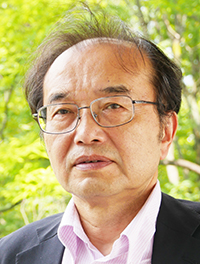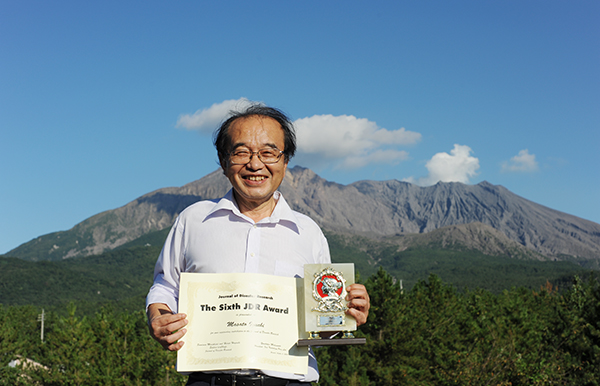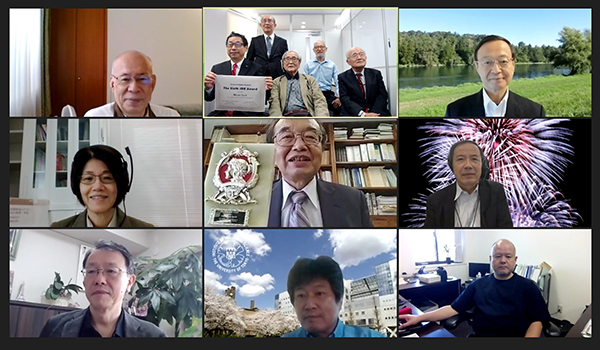single-award.php
JDR award 2020
 JDR AWARD 2020 WINNER |
|
 |
|
| Masato Iguchi Professor, Sakurajima Volcano Research Center, Disaster Prevention Research Institute (DPRI), Kyoto University, Kagoshima, Japan |
|
Testimonial
Presenting the Sixth JDR Award
It is our great pleasures to present the sixth JDR Award to Prof. Masato Iguchi. Prof. Iguchi, as the top guest editor, published two JDR special issues entitled “Integrated Study on Mitigation of Multimodal disasters caused by Ejection of Volcanic Products.” These special issues, vol.11, no.1 in 2016 and vol.14, no.1 in 2019, were results of a project (2013–2018) of the Science and Technology Research Partnership for Sustainable Development (SATREPS). The second special issue set a record for the highest annual download. In addition, he was the first author or co-author of 11 papers published by JDR in 2019.
Professor Iguchi, as one of most recognized volcanologists in the world, has been leading observation research of active volcanoes as the Director of the Sakurajima Volcano Research Center of Kyoto University’s Disaster Prevention Research Institute. He has promoted geophysical research on volcanic activity not only in Japan but also in Indonesia, evaluating volcanic activity by incorporating the results of material science and demonstrating the effectiveness of long-term, multi-item observations in those processes. He has made a significant contribution to the promotion of Indonesian volcano research, taking over the strong will of former Kyoto University professors, and his contributions have culminated in the aforementioned two special issues.
On behalf of the JDR editorial board, I wish to thank Prof. Iguchi for his efforts and to congratulate him as the winner of the sixth JDR Award.
Setsuya Nakada
Director-General,
Center for Integrated Volcano Research,
National Research Institute for Earth Science and Disaster Resilience, Japan
Message from the Winners
A volcanic eruption is a phenomenon in which ballistic bombs, lapilli, volcanic ash, lava, and gas are discharged. Volcanic ash and gas are carried by the wind, and pyroclastic flows and lava flows are carried away by the force of gravity. These cause disasters of various forms in the areas around volcanoes, sometimes far from eruptive center. Accordingly, volcanic countries, particularly Asian countries such as Japan, Indonesia, and the Philippines, have been the scenes of volcanic disasters. We conducted the research project “Integrated study on mitigation of multimodal disasters caused by the ejection of volcanic products” with the Center for Volcanology and Geological Hazard Mitigation and other institutes in Indonesia under the SATREPS project from FY2013 to 2018. The aim of the project was to advance volcanic hazard mitigation, and I served as the guest editor of “Special Issue on Integrated Study on Mitigation of Multimodal Disasters Caused by Ejection of Volcanic Products” (2016) and “Special Issue on Integrated Study on Mitigation of Multimodal Disasters Caused by Ejection of Volcanic Products: Part 2” (2019) of the Journal of Disaster Research. The articles in the Special Issues have been downloaded by many researchers. The Special Issues cover many topics related to volcanic disasters, but the main theme is how to forecast real-time volcanic hazards using data monitoring, since it is this monitoring that triggers the issuing of warnings.
I have studied the volcanic activity of Sakurajima, the most active volcano in Japan, for 40 years, primarily to forecast its eruptions. Forecasting the eruptions is not as important as forecasting the hazards and risks posed by volcanic actions. Research done on the mitigation of the volcanic hazards of Sakurajima as well as Indonesian volcanoes has been enhanced by interaction. The cumulative volume of magma stored in the past 100 years indicates that Sakurajima has the potential for a large-scale eruption (VEI > 4). An eruption and its dispersal of volcanic ash in particular would cause a variety of disasters over a wide area, as described in the other issues of Journal of Disaster Research. I hope that the research results will be utilized for hazard mitigation in the event of future large-scale eruptions. The research could be advanced through collaboration with studies aimed at the enhancement of resilience and recovery.
Masato Iguchi
October 10, 2020
Congratulations!
The Sixth JDR Award ceremony was held online due to COVID-19 on October 6, 2020 and a prize were given to Professor Masato Iguchi, Disaster Prevention Research Institute (DPRI), Kyoto University, Japan. We congratulate the winner and sincerely wish for future success.

Photo: The JDR Award certificate and plaque were presented to the winner, Prof. Masato Iguchi.

Photo: The winner and the JDR editors at the ceremony. From the left in the upper row, Dr. Syunsuke Ikeda, Dr. Haruo Hayashi, Dr. Sumio Shinoda, Dr. Suminao Murakami, Dr. Hideaki Karaki, Dr. Katsuki Takiguchi, Prof. Koji Ikeuchi; from the left in the middle row, Prof. Keiko Tamura, the winner Prof. Masato Iguchi, Prof. Setsuya Nakada; from left in the lower, Dr. Naoshi Hirata, Prof. Takaaki Kato, and Prof. Tomoyuki Takahashi.